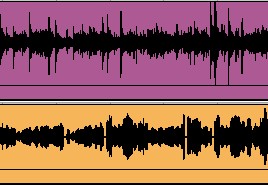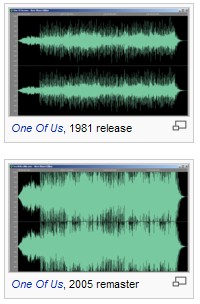Loudness Wars
While my contest has been plugging away, I’ve been doing a bit of writing and recording myself. A couple months back I posted a new tune called On the Mend. More recently, I wrote another tune to go with it called Blaze in the Barn. Before Christmas I spent some time recording the set and ultimately learning quite a lot about mixing and how sound works in a mix, or in many cases, doesn’t work.

In my experimentation with this new set of tunes, I discovered an interesting phenomenon. What I found was that anytime I added compression to an instrument, it immediately sounded better. It actually took some time before I started questioning why this might be true. Without going into lots of technical details, the net effect of compression is that it essentially allows you to make quieter sounds of a track louder but without making the louder tones louder. This gives the listener the sense that the track is more solid and it is perceived as becoming louder. And, apparently, louder is better. Also, as I soon found out, I was not really the first person to stumble on this phenomenon.
Back in the days of juke boxes, you see, record executives discovered that the records that were most frequently played were the ones that were recorded the loudest. Humans, for some reason, perceive the louder records as being better and, in turn, are more likely to stick another dime in the juke box, baby. Thus, record companies started to look for ways to make their recordings louder than the competitions recordings. What resulted was a loudness war that is still raging today and is killing the quality of recorded music.
Well, if we perceive louder recordings to be better, then why is it killing the quality of recorded music you ask? The answer has to do with dynamic range. By compressing music, which allows studio engineers to make recordings louder, they are also squashing the dynamic range of the recording. Dynamic range, in sound, is the distance between the softest tones and the loudest tones and it is used in music to impart emotion. So reducing dynamic range essentially reduces the emotion.
One everyday example of dynamic range that we have come to depend on is that of the human voice. When we speak our voices naturally fluctuate in volume as a means of emphasizing our emotions. If we were to take out all the dynamic range in our voice we would sound very monotonous. Now, imagine taking that monotonous voice and making it loud all the time. The effect would be that all our conversations would consist entirely of yelling. While yelling certainly gets peoples attention, it also gets tiring very fast. And this leads me back to my recording discovery.
What I found was that when I added compression and, in turn, loudened my recording I thought, ‘Hot spit! That sounds great!!!’ But the more I listened to it, the more it started grating on my nerves, sort of like yelling. I had inadvertently stumbled into the loudness war, which is being fought between record companies that want their music to catch your attention as you flip by on your new satellite radio and the sound engineers of the world that realize that the greatest recordings are not devoid of dynamic range but instead, embrace it.
Take a look at the following example:

What you are looking at is a mastered stereo recording of an ABBA song from 1981 and then remastered in 2005. The first set of sound waves show a track with plenty of dynamic range while the second set of waves show much more sound and, consequently, represent a louder track, but one with much less dynamic range.
With all this in mind, I removed much of the compression I was using on my new set and found that I enjoy the track much more now. Anyhow, here is a mix of what I’ve been working on. I don’t know if it is a final mix because there are other issues I’m trying to address, but those issues are probably the subject of another post.